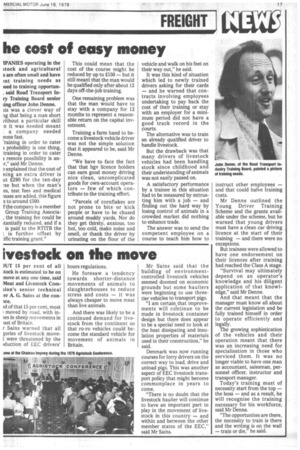he cost of easy money
Page 19

If you've noticed an error in this article please click here to report it so we can fix it.
IPANIES operating in the gtock and agricultural. s are often small and have flt training needs as )sed to training opportun, said Road Transport Inry Training Board senior ting officer John Denne.
us was a clever way of rig that being a man short vithout a particular skill n it was needed meant . a company needed eone fast.
'raining in order to cater probability is one thing, training in order to cater remote possibility is an;r," said Mr Denne.
a explained that the cost of ning an extra driver is ut £290 for the ten-day rse but when the man's es, test fees and medical .itises are added, this figure s to around £500.
f the company is a member Group Training Associa, the training fee could be itantially reduced, and if a is paid to the RTITB the is further offset by ific training grant." This could mean that the cost of the course might be reduced by up to £150 — but it still meant that the man would be qualified only after about 12 days off-the-job training.
One remaining problem was that the man would have to stay with a company for 12 months to represent a reasonable return on the capital investment.
Training a farm hand to become a livestock vehicle driver was not the simple solution that it appeared to be, said Mr Denne.
"We have to face the fact that that hgv licence holders can earn good money driving nice clean, uncomplicated goods for own-account operators — few of which contribute to the training effort.
"Parcels of cornflakes are not prone to bite or kick people or have to be chased around muddy yards. Nor do they get thirsty, anxious, too hot, too cold, make noise and smell, or thank the driver by urinating on the floor of the vehicle and walk on his feet on their way out," he said.
It was this kind of situation which led to newly trained drivers asking for their cards — and he warned that contracts involving employees undertaking to pay back the cost of their training or stay with an employer for a minimum period did not have a good track record in the courts.
The alternative was to train an already qualified driver to handle livestock.
But the drawback was that many drivers of livestock vehicles had been handling stock since childhood and their understanding of animals was not easily passed on.
A satisfactory performance by a trainee in this situation had to be measured by entrusting him with a job — and finding out the hard way by losing control of animals in a crowded market did nothing to enhance trade.
The answer was to send the competent employee on a course to teach him how to
















































































































